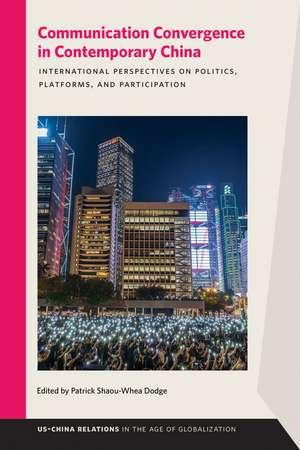Communication Convergence in Contemporary China: International Perspectives on Politics, Platforms, and Participation: US–China Relations in the Age of Globalization
Editat de Patrick Shaou-Whea Dodgeen Limba Engleză Paperback – 31 oct 2020
Preț: 340.29 lei
Nou
Puncte Express: 510
Preț estimativ în valută:
65.11€ • 67.99$ • 53.77£
65.11€ • 67.99$ • 53.77£
Carte indisponibilă temporar
Doresc să fiu notificat când acest titlu va fi disponibil:
Se trimite...
Preluare comenzi: 021 569.72.76
Specificații
ISBN-13: 9781611863765
ISBN-10: 1611863767
Pagini: 332
Ilustrații: 17
Dimensiuni: 152 x 229 x 20 mm
Greutate: 0.45 kg
Ediția:1
Editura: Michigan State University Press
Colecția Michigan State University Press
Seria US–China Relations in the Age of Globalization
ISBN-10: 1611863767
Pagini: 332
Ilustrații: 17
Dimensiuni: 152 x 229 x 20 mm
Greutate: 0.45 kg
Ediția:1
Editura: Michigan State University Press
Colecția Michigan State University Press
Seria US–China Relations in the Age of Globalization
Recenzii
“Media convergence is well-known as a concept, but as a historical process, it is complicated by changing social contexts. This volume studies
media convergence in China while making sensitive comparisons with the United States. The result is an engaging comparative study that illuminates the concrete processes of media convergence and fragmentation in both countries. This is an important contribution to the study of global communication as well as media politics in China.”
—GUOBIN YANG, Grace Lee Boggs Professor of Communication and Sociology, Annenberg School for Communication, University of Pennsylvania
media convergence in China while making sensitive comparisons with the United States. The result is an engaging comparative study that illuminates the concrete processes of media convergence and fragmentation in both countries. This is an important contribution to the study of global communication as well as media politics in China.”
—GUOBIN YANG, Grace Lee Boggs Professor of Communication and Sociology, Annenberg School for Communication, University of Pennsylvania
Notă biografică
PATRICK SHAOU-WHEA DODGE is an Associate Professor Clinical Track and past Associate Program Chair at the University of Colorado Denver’s International College Beijing. He was a member of the National Communication Association’s Task Force on Fostering International Collaboration in the Age of Globalization and worked with the Communication University of China to co-organize NCA-CUC cosponsored biennial conferences in 2016 and 2018. In 2019 he worked with Shenzhen University to co-organize the NCA-SZU 2019 Shenzhen Forum. Dodge was the 2018 inaugural fellow for the NCA-CUC Visiting Fellows Program for Communication and Media Research. He is also the 2018–2020 Association for Chinese Communication Studies’ Vice President and will serve as the ACCS President in 2020–2022.
Descriere
In a speech opening the nineteenth Chinese Communist Party Congress meeting in October 2017, President Xi Jinping spoke of a “New Era” characterized by new types of communication convergence between the government, Party, and state media. His speech signaled that the role of the media is now more important than ever in cultivating the Party’s image at home and disseminating it abroad. Just a year before Xi proclaimed the New Era, scholars had convened in Beijing at a conference cohosted by the Communication University of China and the US-based National Communication Association to address questions about information flows, control, and regulation that directly affect the future of US–China relations. Communication Convergence in Contemporary China presents international perspectives on US –China relations in this New Era with case studies that offer readers informative snapshots of how these relations are changing on the ground, in the lived realities of our daily communication habits.




